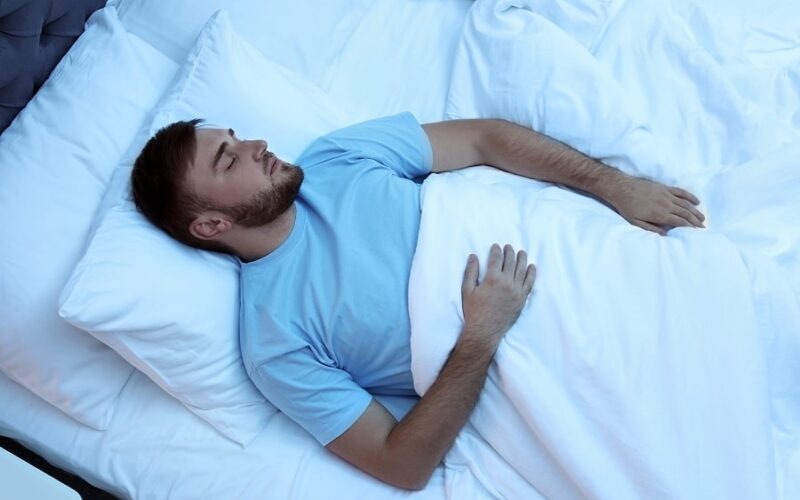Sudden jerks and twitches during sleep can be frustrating. There is no need to feel weird about it when you find out that you twitch in your sleep; about 70% of people do that, so it is normal in some way. If you often ask questions like why men twitch in their sleep, maybe for yourself, your partner, or someone around you, then you have come to the right place. In this article, I will be answering all your questions!
Key Takeaways
- Twitching in sleep, sometimes referred to as hypnic jerks or sleep beginnings, is described as an uncontrollable muscular movement when a person is about to nod off.
- Although the exact cause is not known, researchers have proposed that stimulants, anxiety, muscle relaxation, and stress might be some reasons why men twitch in their sleep.
- To reduce these twitches, men should Reduce Caffeine Intake, Exercise During the Day, Avoid Stimulants, and take Relaxing Medications.
Why Do Men Twitch in Their Sleep?

Although the exact cause is not known, researchers have proposed some reasons why twitches occur in men in their sleep. Here are some of the reasons below:
Stimulants
Stimulants, such as drugs, caffeine, and alcohol, can increase the rate at which men twitch in their sleep. Nicotine, found in cigarettes, is a stimulant, increasing the likelihood of muscle spasms in smokers and vapers at night.
Anxiety and Stress
Twitching in sleep may be more pronounced in people who undergo a lot of stress and often have anxiety attacks. Due to the stressed body, one’s normal sleep might be disrupted, thereby increasing the likelihood of twitching during sleep.
Dream-Related Theories
Some researchers say sleep twitches occur due to the interaction between sleep stages and dreaming. These theories suggest twitches may represent a motor response to the dream’s content. For instance, if you are playing football or running in your dream, your brain is more likely to generate muscle movements, which may result in twitches.
Muscle Relaxation
Your muscles relax as you sleep, and your brain releases messages that prevent you from moving your muscles voluntarily. When the brain abruptly switches from being awake to going to sleep, it can occasionally cause a short break in communication between the muscles and the brain. Sometimes, twitches are caused by this abrupt relaxation and subsequent muscular relaxation.
Physical Stress
Your body will be physically stressed if you work out before bed. It might have a stimulating effect and possibly make twitching more frequent.
There is no definitive reason why men twitch in their sleep; however, factors like anxiety, stress, physical stress, muscle relaxation, and stimulants may cause men to twitch.
How Do I Stop My Partner From Twitching in His Sleep?

Reduce Caffeine Intake
It is necessary to reduce the intake of caffeine in the body. Caffeine is a stimulant, and it can increase the occurrence of muscle spasms at night. If your partner takes a lot of caffeine, you should ask him to reduce the caffeine intake and replace it with other liquids if he must take in liquids.
Exercise During the Day
It pays to exercise during the day to prevent the body from being fatigued at night. Exercise helps to ease stress and makes you feel much better. Aside from working around at work or going around with daily activities, you should ask your partner to be more intentional about exercising. Brisk walks, pull-ups, jogging, and the rest will help prevent the body from being fatigued.
Avoid Stimulants
Stimulants speed up messages to the brain, making you act more than you normally should. Let’s take nicotine as an example. It has been found to increase the occurrence of muscle spasms at night in smokers and vapers. According to a study made in 2019, smoking tends to reduce the quality of sleep.
Relaxing Medications
Advising your partner to take prescribed medications and to take deep breaths can also help reduce stress levels.
The Science Behind Men Twitching in Their Sleep

To comprehend why men might twitch during sleep, it’s important to understand the different sleep stages. Sleep is divided into two main categories: non-REM (Rapid Eye Movement) and REM sleep.
- Non-REM Sleep: Non-REM sleep consists of three stages: N1 (light sleep), N2 (deepening sleep), and N3 (deep sleep). During these stages, muscle activity decreases, and the body typically becomes more relaxed. Twitching doesn’t really occur at this phase.
- REM Sleep: REM sleep is the stage where most vivid dreams occur. Interestingly, the brain becomes highly active during REM sleep, while voluntary muscles become temporarily paralyzed to prevent us from acting out our dreams. During this paradoxical stage, twitching, or more specifically, rapid eye movements (REM), can occur.
Twitching in sleep, sometimes referred to as hypnic jerks or sleep beginnings, is described as an uncontrollable muscular movement when a person is about to nod off. These motions are frequently abrupt and may give the impression that you are falling or tripping. Furthermore, hypnic jerks might cause someone to wake up abruptly and be frightened.
As you go from being awake to being asleep, your brain “misfires” electrically. Twitching typically happens as you start to drift off to sleep and your muscles start to relax. The brain’s motor centers may suddenly become aroused during this moment. During a less-than-smooth transition to sleep, your brain could mistakenly interpret this stimulus as being awake.
Conclusion
Both men and women can experience random twitching during the night, which is completely normal. Reducing the intake of stimulants and exercise at the right time will help reduce this occurrence. If your partner twitches very often and all measures listed in the article are duly followed, it is best to go and see medical personnel.
Related Articles
- Are Vivid Dreams a Sign of Mental Illness? Everything You Need
- How Does Cyberbullying Affect Mental Health? Evidence-Based
- Practical Ways to Relieve Tension in the Neck and Shoulder
- Broken Wrist Syndrome in Autism: Symptoms, Causes, Prevention & Treatment
- 9 Powerful Ways to Celebrate Men’s Mental Health Month Before June Ends






